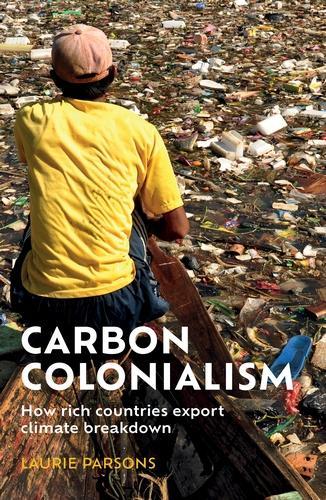
Carbon Colonialism: How Rich Countries Export Climate Breakdown
(Hardback)
Available Formats
Publishing Details
Carbon Colonialism: How Rich Countries Export Climate Breakdown
By (Author) Laurie Parsons
Manchester University Press
Manchester University Press
1st June 2023
23rd May 2023
United Kingdom
Classifications
Tertiary Education
Non Fiction
Manufacturing industries
363.73874
Physical Properties
Hardback
248
Width 129mm, Height 198mm, Spine 14mm
358g
Description
Around the world, leading economies are announcing significant progress on climate change. World leaders are queuing up to proclaim their commitment to tackling the climate crisis, pointing to data that shows the progress they have made. Yet the atmosphere is still warming at a record rate, with devastating effects on poverty and precarity in the worlds most vulnerable communities. Are we being deceived
Climate change is devastating the planet, and globalisation is hiding it. This book opens our eyes.
Carbon colonialism explores the murky practices of outsourcing a countrys environmental impact, where emissions and waste are exported from rich countries to poorer ones; a world in which corporations and countries are allowed to maintain a clean, green image while landfills in the worlds poorest countries continue to expand, and droughts and floods intensify under the auspices of globalisation, deregulation and economic growth.
Taking a wide-ranging, culturally engaged approach to the topic, the book shows how this is not only a technical problem, but a problem of cultural and political systems and structures from nationalism to economic logic deeply embedded in our society.
Reviews
'Carbon colonialism is a timely analysis of the contradictions of climate politics. It not only makes visible the concealed costs of extraction hidden beneath the shiny sustainability commitments of Global North politics, but also provides an eye-opening account of climate breakdown in the Global South.'
Matthias Schmelzer, author of The Future Is Degrowth
'By taking readers on a journey through landscapes poisoned by the effluvia of economic growth, Laurie Parsons exposes the ongoing impact of colonialism and global capitalism on some of the most vulnerable places on earth. Read this book if you want to understand how the impacts of history are still reverberating today.'
Carry Somers, founder of Fashion Revolution
'Carbon colonialism is an uncomfortable book to read from the comforts of the rich world. It is unsettling because Laurie Parsons renders visible through curated cases and close argument the global signatures of environmental risk, exposure and reward, and the structural violence of climate change.'
Jonathan Rigg, Professor of Human Geography, University of Bristol
'An eye-opening, fact-based indictment of the current path were on, one where rich countries and companies are accumulating the resources to mitigate the impacts of climate change rather than moving to stop environmental destruction.'
Assaad Razzouk, author of Saving the Planet Without the Bull
'Carbon colonialism exposes the uneven geography of the climate crises through thoughtful field work, detailing how destructive global environmental change is teleconnected to impoverishment. Parsons traces the ways in which the most egregious effects of climate change are found at the bottom of global gradients of inequality while tackling head on the myths that surround the political economy of climate change.'
Andrew Brooks, Reader in Uneven Development, King's College London and author of Clothing Poverty
'Carbon colonialism is a welcome salve to the pernicious greenwashing that pollutes contemporary capitalism. Laurie Parsons skillfully weaves ethnographic encounters with detailed research to craft a book that is both timely and urgently necessary. Carbon Colonialism asks critical questions about the status-quo, where life is cheap, destruction is uneven, and profit is extracted from our planetary future.'
Thom Davies, Associate Professor in Geography, University of Nottingham and co-editor of Toxic Truths
'Parsons takes everyday objects bricks, a pair of socks, teabags and draws out lessons from their global supply chains. And it was great to hear more from Cambodia, a country we dont hear from very much, and where Parsons has spent a lot of time. Altogether, Carbon colonialism is a stark reminder that for all its apparent environmental progress, consumer capitalism still relies on invisible "elsewheres" to keep the economic wheels turning.'
Jeremy Williams, The Earthbound Report
Author Bio
Laurie Parsons is Senior Lecturer in Human Geography at Royal Holloway, University of London and Principal Investigator of the projects The Disaster Trade: The Hidden Footprint of UK Imports and Investment Overseas and Hot Trends: How the Global Garment Industry Shapes Climate Vulnerability in Cambodia. His other books include Going Nowhere Fast: Inequality in the Age of Translocality and Climate Change in the Global Workplace.
